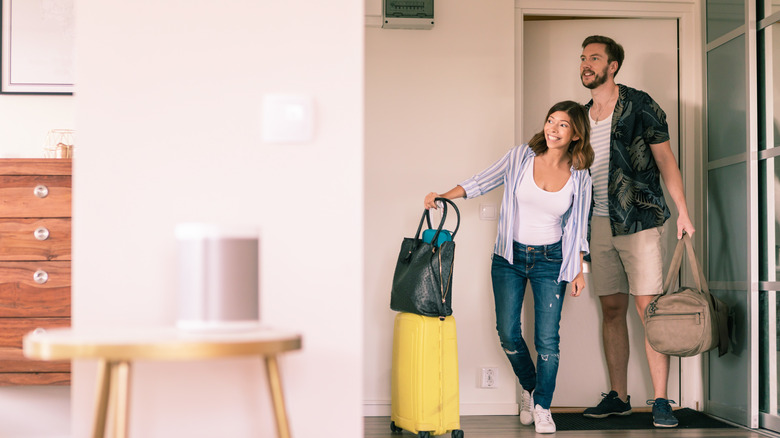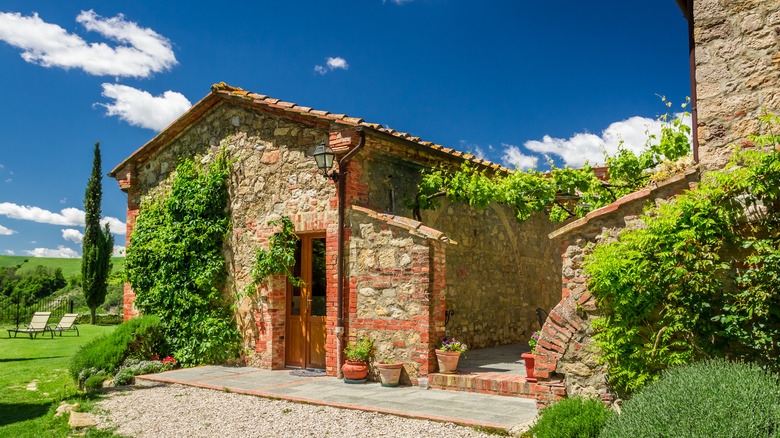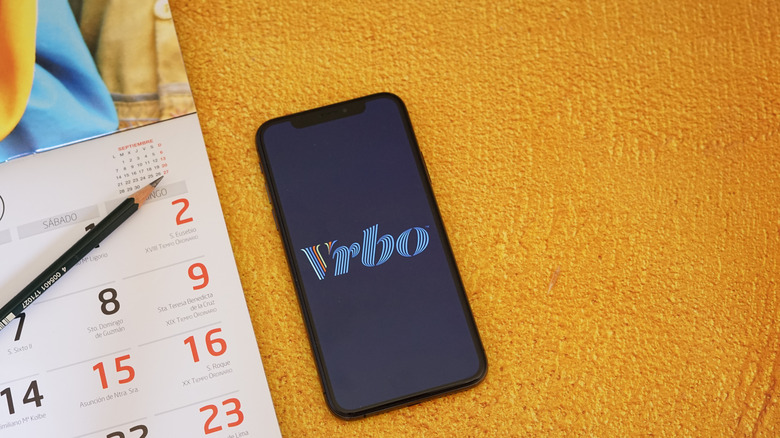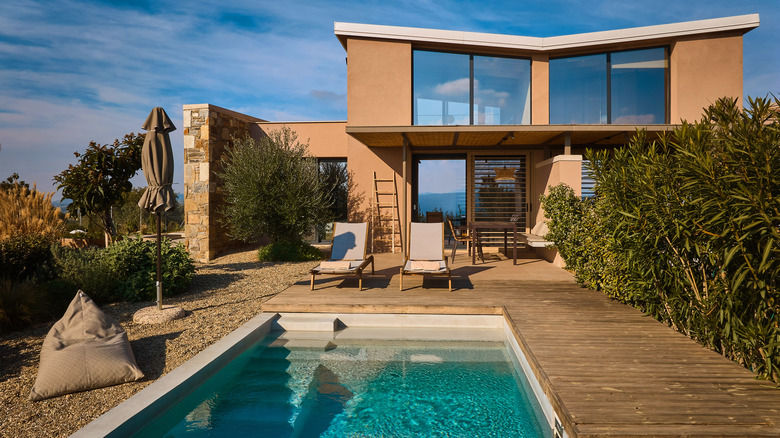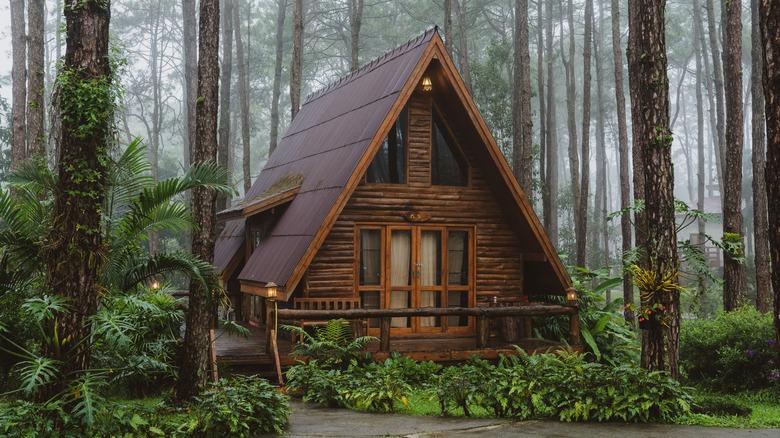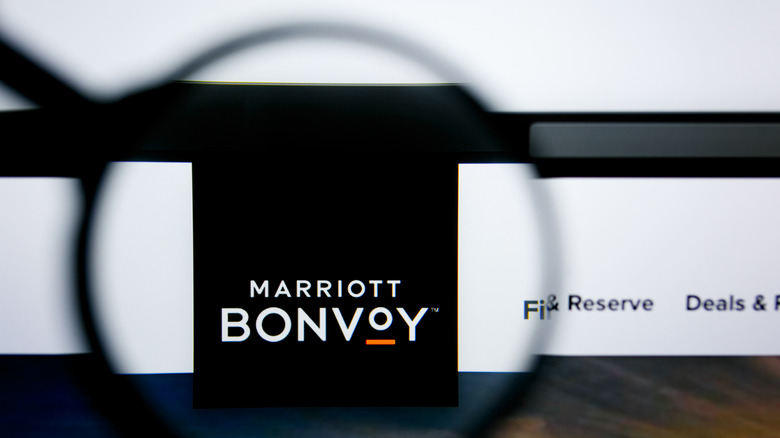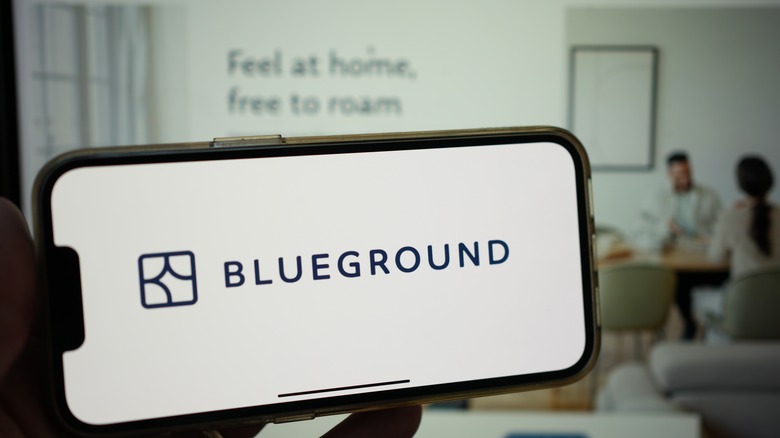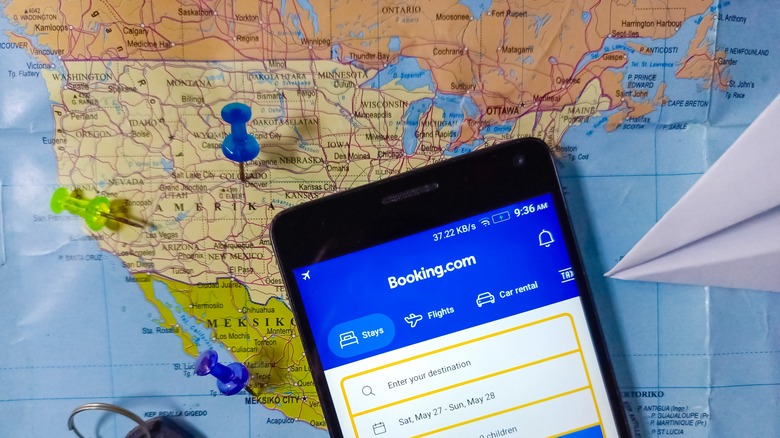10 Safer Alternatives To Airbnb, According To Research
If you are dreaming of your next getaway but worried about the pitfalls of short-term rentals, you are not alone. Over the past decade, Airbnb has transformed the way we travel, opening up charming apartments, unique cottages, and one-of-a-kind stays across the globe. Yet there are mounting concerns as Airbnb grows — misleading listings, inconsistent safety standards, last-minute cancellations, and even fraudulent hosts. For many travelers, the convenience of "living like a local" is no longer worth the uncertainty. True, there are simple things to check to avoid getting scammed on Airbnb, but these things are by no means foolproof.
That's where alternative platforms step in with professional property management, comprehensive identity checks, and clear accountability. These differences not only make things safe by helping you avoid common travel scams before your vacation, but they also offer hotel-style reliability with the personality of a vacation rental. What's more, many of these companies have extras Airbnb doesn't always guarantee, including built-in insurance, transparent refund policies, or reliable customer support to step in if something goes wrong. For families, solo travelers, or anyone with safety concerns, that added layer of assurance often makes for a smoother trip. So, if you are looking for another option, then here are the 10 safer alternatives to Airbnb, according to research.
Plum Guide
Plum Guide is often described as the "Michelin Guide for vacation rentals," and for good reason. On Airbnb, virtually anyone can list a property with minimal oversight, but Plum accepts only a small fraction of homes that apply to be featured on its platform. This rigorous vetting process includes over 150 individual checks covering everything from Wi-Fi speed and water pressure to design quality and cleanliness. As a result, Plum's hardline approach significantly reduces the chance of false advertising, misleading photos, or substandard conditions.
An added bonus here is that Plum Guide also conducts on-site inspections, completed by trained reviewers who personally evaluate whether a property meets the platform's criteria. These visits go far beyond a quick background check or automated listing approval. Instead, they ensure that every accepted home is accurately represented, safe for guests, and equipped to deliver a consistently high-quality stay. Plum removes much of the guesswork that comes with booking on open marketplaces by prioritizing detail and in-person verification. Plum's exclusivity is part of its appeal as well. With only about 3% of homes reviewed making the cut, the platform guarantees a curated collection that travelers can trust. That means fewer listings overall, but a much higher level of reliability — an important factor for families, business travelers, or anyone wary of common Airbnb complaints such as misleading descriptions or last-minute cancellations.
Vrbo (HomeAway)
Once known as HomeAway, Vrbo has established itself as one of the most reliable alternatives to Airbnb by putting traveler security at the center of its platform. One of its standout features is the Book with Confidence Guarantee, which offers comprehensive customer support, secure payment protection, and direct assistance if issues arise before or during a stay. That means if a host cancels unexpectedly or a property isn't as advertised, Vrbo steps in to either rebook guests or provide a refund—protections that significantly reduce the risk of being left stranded.
The platform also backs its listings with a $1 million liability insurance program, giving both hosts and guests peace of mind. Thus, if accidents or damages occur, additional financial coverage, such as liability insurance, can make a real difference, offering safeguards beyond what is standard. In addition, Vrbo ensures that support is more than just a marketing promise with its centralized trust and safety hub (designed to resolve issues quickly and fairly). Vrbo also requires identity verification for hosts and enforces strict listing standards to help prevent fraudulent properties from happening. And, with no vague profiles on this platform, Vrbo's verification process makes it harder for scammers to gain a foothold. This emphasis on accountability not only improves transparency but also builds confidence for travelers booking in unfamiliar destinations.
onefinestay (by Accor)
Part of the Accor hotel group, onefinestay takes a hotel-inspired approach to private home rentals that makes it stand out as a safer option than traditional peer-to-peer platforms. Here, every property is thoroughly inspected and specifically handpicked, which means guests don't have to worry about things like misleading photos, unverified hosts, or their general safety. As a result, this kind of selection process ensures that each home meets high standards for comfort, maintenance, and security before it is ever listed.
Beyond property quality, onefinestay offers services that mirror those of luxury hotels — something Airbnb typically leaves to individual hosts. Guests are greeted with a personal welcome at check-in, provided with professional housekeeping, and supported by a committed in-stay assistance team. If something goes wrong, whether it's a maintenance issue or a safety concern, travelers know there is always someone on call who is trained to resolve the situation quickly. Furthermore, this alternative also publishes a clear housekeeping and guest-safety commitment, outlining sanitation standards and staff training designed to meet or exceed global hospitality benchmarks, which demonstrates that your well-being is a priority. And when it comes to the post-pandemic travel landscape, this emphasis on professional cleaning and consistent protocols is a meaningful safeguard. All in all, having access to private homes with the safety net of hotel-style oversight reduces the common risks associated with short-term rentals — making onefinestay a trusted alternative for travelers who value both comfort and security.
Vacasa
Vacasa has grown into one of the largest vacation rental management companies in North America by emphasizing professional oversight rather than leaving quality control to individual hosts. Unlike Airbnb, where the guest experience can vary dramatically from one property to the next, Vacasa's portfolio of whole homes is professionally managed, creating a standardized level of safety and reliability. This includes everything from guest communication to on-site property care, so travelers know someone is accountable for looking after their stay.
What's more, Vacasa's on-call guest support, with local managers available to respond to issues in person, is a major perk when it comes to safety. So, whether your stay's lock malfunctions late at night or there is an unexpected maintenance problem, guests have access to trained staff who can help. And, this on-call, professional backup helps prevent minor inconveniences from becoming major safety concerns, which is dissimilar to peer-to-peer rentals, where reaching the host can sometimes be unpredictable. Vacasa also places strong emphasis on preventive operations. Each property undergoes pre-arrival inspections to ensure it's clean, stocked, and safe before guests check in. Its premium cleaning standards are designed to meet or exceed CDC guidelines as well. Plus, when you factor in regular amenity checks — like ensuring smoke detectors, appliances, and heating systems work properly — further reducing the chances of guests encountering unsafe conditions. This structure makes it a safer, more dependable choice for alternative vacation rentals to Airbnb.
Homes & Villas by Marriott Bonvoy
Homes & Villas by Marriott Bonvoy sets itself apart from peer-to-peer rental platforms by blending the space and character of vacation homes with the oversight and standards of a global hotel brand. This is in stark contrast to Airbnb, where individual hosts may or may not follow consistent practices. However, every property in Marriott's collection is professionally managed and must meet the company's rigorous hospitality standards, helping to keep guests and their belongings safe while staying in their hotels (or homestays). This ensures travelers enjoy the reliability and accountability typically associated with hotels, while still experiencing the comfort of a private home.
Safety and quality are not left to chance. Properties are carefully vetted, audited, and regularly reviewed to guarantee they meet operational standards, from fire safety and maintenance to housekeeping and guest readiness. This process reduces the risks of arriving at a rental that doesn't match its description — an issue that remains one of the most common complaints on peer-to-peer platforms. Marriott's emphasis on compliance also means that guests benefit from consistent expectations across different destinations, whether they're booking a city apartment in London or a beachfront villa in Mexico. In addition, guests booking through Homes & Villas enjoy the security of round-the-clock customer service backed by Marriott's global infrastructure. If an issue arises, there's a trusted corporate entity to turn to, not just an individual host who may or may not respond. And when you coupled that with the ability to earn and redeem Marriott Bonvoy points, the platform adds both value and trust to the short-term rental experience.
HomeExchange
Alternatively, HomeExchange offers wanderlusters a unique approach to travel accommodations. Instead of simply booking a place to stay, you are essentially home swapping sans the cash transactions. In this instance, members exchange stays in each other's properties via HomeExchange's GuestPoints system. Not only are you eliminating the nightly rate cost common on other peer-to-peer rental platforms, but you are also actively avoiding common vacation rental scams since there is no direct money changing hands between guests and hosts or members.
To build trust, HomeExchange requires identity verification and contact validation for its members, ultimately deterring bad actors. This particular platform also manages security deposits and guarantees, so you have coverage in the rare event of property damage or disputes. All of this helps to ensure fairness and discourage harmful behavior. Since members are sharing their homes, a system is in place where mutual trust and respect are essential to participation. HomeExchange's model naturally encourages careful stewardship. Members are more invested in maintaining their homes to high standards because they, too, will be staying in someone else's. This exchanging of homes creates built-in safety, cleanliness, and transparency that's not always present elsewhere. Thus, travelers seeking affordability without sacrificing security can also consider using HomeExchange.
TrustedHousesitters
TrustedHousesitters also approaches short-term stays differently. Here, the exchange involves pet and home care minus the nightly rate. Travelers stay in someone's home free of charge in exchange for looking after pets — creating a mutually beneficial arrangement that reduces the typical risks tied to rental payments or booking scams. Because money isn't exchanged for nightly rates, the platform eliminates one of the most common sources of fraud that travelers face on sites like Airbnb.
To maintain a secure community, TrustedHousesitters requires comprehensive ID verification and, in the United States, background checks for sitters. These checks help ensure that only trustworthy individuals are matched with homeowners, and they give homeowners added confidence when opening their doors to guests. At the same time, sitters can also review detailed host profiles, creating accountability on both sides of the exchange. Built-in liability protections and an around-the-clock support line also provide coverage in case of accidents or emergencies, which ensures that if something unexpected happens, whether with a pet or a problem in the home, help is readily available. In addition, TrustedHousesitters maintains a clear Trust & Safety hub that outlines its vetting process, insurance coverage, and guidelines for safe exchanges. And with background checks, identity verification, built-in protections, and continuous support, TrustedHousesitters reduces many of the uncertainties travelers face on Airbnb. For animal lovers especially, it offers a safer, community-driven way to travel while enjoying the comforts of a real home.
Blueground
Even Rick Steves can admit that somethings a house or apartment rental sometimes makes more sense than staying in a hotel. Blueground has carved out a niche in the rental market, in a sense, by offering fully furnished apartments for stays of up to 30 days or longer. With Airbnb, listings are managed by a mix of individual hosts with varying experience levels. Yet, Blueground maintains direct operational control over its properties, offering a centralized model that allows for consistent standards across multiple cities worldwide.
A key strength of Blueground is its customer support and issue resolution, which are managed through the app. Not only can guests report maintenance concerns or emergencies, but they can also expect a timely response from a professional team, not just a host who may be unavailable. For longer stays — whether for work relocations, study abroad programs, or extended travel — this immediate and reliable support reduces the risks associated with unexpected breakdowns, safety hazards, or unresponsive management. Blueground is also at the helm, managing its own portfolio, so things like quality control, preventive maintenance, standardized cleaning, furnishing, and safety protocols are all uniform across all apartments. Travelers don't have to worry about homes that fail to meet expectations or any of the other common pitfalls. Therefore, Blueground is especially appealing for business travelers, families, and digital nomads seeking stability abroad.
Fairbnb.coop (ethical, community-funded stays)
Fairbnb.coop is viewed as a more ethical and transparent alternative to mainstream short-term rental platforms for a reason. The primary goal for this company is to combine community impact with traveler protections. To stand out from the rest, Fairbnb.coop requires hosts to comply with local regulations and provide documentation to prove legitimacy. This commitment reduces the likelihood of illegal listings, helps ensure guests stay in properties that meet community and safety standards, and doesn't fuel over-tourism or allow unregulated rentals.
Furthermore, Fairbnb.coop prioritizes the safety of everyone, not just travelers — and this is demonstrated by the choice to reinvest 50% of booking fees in local cultural preservation, environmental initiatives, and community services. Also, by discouraging speculative, multi-property operators and focusing on local hosts, Fairbnb.coop minimizes neighborhood friction, which makes it safer not only for guests but also for the communities they visit. Fairbnb.coop also limits the number of properties a single operator can list, preventing large-scale commercial exploitation and the inconsistent standards that often follow.
As a smaller, more intentioned network, Fairbnb.coop garners a higher degree of trust, transparency, and oversight compared to Airbnb's open marketplace. For travelers, that means more than just a place to stay — it means booking with confidence that their accommodations are legitimate, community-approved, and free from the red flags that often accompany under-regulated rentals. By aligning safety with social responsibility, Fairbnb.coop offers reassurances in more ways than one.
Booking.com (for hotels & serviced apartments)
It can be hard to choose between and Airbnb or hotel stay. Booking.com, best known for its vast hotel listings, makes it a little easier by also offering serviced apartments and vacation rentals — but with the advantage of professional management and established hospitality standards. In fact, many of the accommodations on Booking.com are operated by licensed hotels, apartment providers, or verified property managers. This structure translates into staffed front desks, standardized safety protocols, and clearer accountability, giving travelers a greater sense of comfort when booking.
Another key safety feature is, of course, customer support, available by phone, app, or chat. So, in the event your reservation falls through or if the property doesn't match its description, Booking.com's support team can step in to resolve disputes or find alternative accommodations. Booking.com also has secure, on-platform payment systems, which protect both guests and property owners. By keeping all financial transactions within the platform, travelers reduce their risk of falling victim to fraudulent requests or fake listings. That said, phishing scams targeting users who take conversations or payments off-platform are still something to be mindful of here. Booking.com advises guests to always communicate and pay through its official channels. Ultimately, for those who want the space of an apartment, an entire home, a villa, or a glampsite with the safeguards of a hotel, it's one of the most dependable options available.
Methodology
In order to identify the safest alternatives to Airbnb, platforms that went beyond the basics and implemented comprehensive safety policies and protective measures took center stage. Having a professional management team, along with vetting processes, was also a must. As a result, companies that fit the bill here then relied on licensed operators or applied strict screening processes, from property inspections to background checks on hosts. This professional layer reduces uncertainty and ensures travelers know what to expect upon arrival.
From identity verification for both hosts and guests to inspection protocols and insurance or financial loss protection guarantees in the event of fraud or last-minute cancellations, the presence of safety guards helped narrow down the search. Moreover, by being able to evaluate how transparently platforms communicated these and similar protections, it was possible to distinguish between superficial promises and meaningful assurances. Finally, top-tier continual customer support and secure, on-platform payment protections were non-negotiable. Reliable service is what gives travelers recourse when something does go wrong — whether it's being locked out of a property, discovering it doesn't match the description, or navigating a cancellation at the last minute. Ultimately, only companies that combine the factors mentioned above made this curated list of alternatives – and with these vacation rentals as possible safer options at their disposal, travelers should have more peace of mind when booking their next stay and embarking on an unforgettable getaway.
